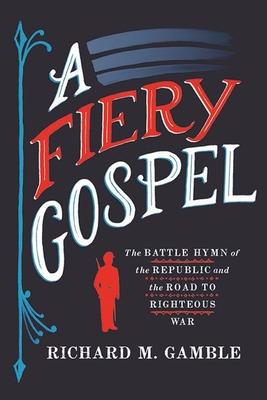A Fiery Gospel: The Battle Hymn of the Republic and the Road to Righteous War

A Fiery Gospel: The Battle Hymn of the Republic and the Road to Righteous War
Since its composition in Washington's Willard Hotel in 1861, Julia Ward Howe's "Battle Hymn of the Republic" has been used to make America and its wars sacred. Few Americans reflect on its violent and redemptive imagery, drawn freely from prophetic passages of the Old and New Testaments, and fewer still think about the implications of that apocalyptic language for how Americans interpret who they are and what they owe the world.
In A Fiery Gospel, Richard M. Gamble describes how this camp-meeting tune, paired with Howe's evocative lyrics, became one of the most effective instruments of religious nationalism. He takes the reader back to the song's origins during the Civil War, and reveals how those political and military circumstances launched the song's incredible career in American public life. Gamble deftly considers the idea behind the song--humming the tune, reading the music for us--all while reveling in the multiplicity of meanings of and uses to which Howe's lyrics have been put. "The Battle Hymn of the Republic" has been versatile enough to match the needs of Civil Rights activists and conservative nationalists, war hawks and peaceniks, as well as Europeans and Americans. This varied career shows readers much about the shifting shape of American righteousness. Yet it is, argues Gamble, the creator of the song herself--her Abolitionist household, Unitarian theology, and Romantic and nationalist sensibilities--that is the true conductor of this most American of war songs.
A Fiery Gospel depicts most vividly the surprising genealogy of "The Battle Hymn of the Republic," and its sure and certain position as a cultural piece in the uncertain amalgam that was and is American civil religion.
PRP: 179.49 Lei
Acesta este Prețul Recomandat de Producător. Prețul de vânzare al produsului este afișat mai jos.
161.54Lei
161.54Lei
179.49 LeiLivrare in 2-4 saptamani
Descrierea produsului
Since its composition in Washington's Willard Hotel in 1861, Julia Ward Howe's "Battle Hymn of the Republic" has been used to make America and its wars sacred. Few Americans reflect on its violent and redemptive imagery, drawn freely from prophetic passages of the Old and New Testaments, and fewer still think about the implications of that apocalyptic language for how Americans interpret who they are and what they owe the world.
In A Fiery Gospel, Richard M. Gamble describes how this camp-meeting tune, paired with Howe's evocative lyrics, became one of the most effective instruments of religious nationalism. He takes the reader back to the song's origins during the Civil War, and reveals how those political and military circumstances launched the song's incredible career in American public life. Gamble deftly considers the idea behind the song--humming the tune, reading the music for us--all while reveling in the multiplicity of meanings of and uses to which Howe's lyrics have been put. "The Battle Hymn of the Republic" has been versatile enough to match the needs of Civil Rights activists and conservative nationalists, war hawks and peaceniks, as well as Europeans and Americans. This varied career shows readers much about the shifting shape of American righteousness. Yet it is, argues Gamble, the creator of the song herself--her Abolitionist household, Unitarian theology, and Romantic and nationalist sensibilities--that is the true conductor of this most American of war songs.
A Fiery Gospel depicts most vividly the surprising genealogy of "The Battle Hymn of the Republic," and its sure and certain position as a cultural piece in the uncertain amalgam that was and is American civil religion.
Detaliile produsului










